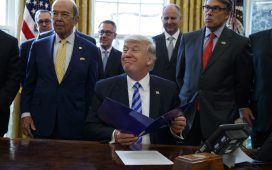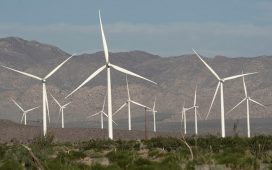“The opportunity for the mining industry is tremendous. An industry that has experienced enormous public pressure and critique, accompanied by offshoring production overseas, can now evolve into one fundamental to supporting a shift to a low-carbon and sustainable energy system based on domestic natural resources,” Dr. Morgan D. Bazilian, Colorado School of Mines, September 17, 2019
Advanced by the Democrat-controlled House Natural Resources Committee last week, Rep. Raul Grijalva’s (D-Tucson) mining bill threatens our “three E’s” of U.S. national security: Energy, Economy, and Environment. The 8% and 12.5% federal royalties involved are overly expensive, and the banning of so many possible mining sites would worsen our already dangerous over-dependence on foreign suppliers.
The U.S. Geological Survey (USGS) reports our problem. For 2018 “critical minerals comprised 14 of the 18 mineral commodities with 100 percent net import reliance and 15 additional critical mineral commodities had a net import reliance greater than 50 percent of apparent consumption.” Mining companies already pay lots in taxes to all levels of government and in royalties to state and local agencies. In short, it is increasingly a national imperative to help them.
Let me explain.
Rep. Raul Grijalva’s burdensome royalties and reduced mining is sure to violently collide with the booming natural resources demand to install the renewable energy and battery storage systems that we know is coming in a carbon-constrained world. The reality is that these low-carbon technologies are far more mineral and metal intensive than conventional sources such as fossil fuels. “Renewable Energy Needs Huge Mineral Supply.”
Most have no substitutes. For example, the electrification of transport will obviously surge the demand for batteries, already quickly mounting because of the Information Revolution. Batteries will continue to require vast amounts of key metals – with cobalt, lithium, and nickel being the most critical (see Figure). As a great benefit, jobs in the U.S. mining industry truly are then: “green jobs.”
Note: I will focus on energy but you should also know that these natural resources are also essential to U.S. national defense systems.

Demand for battery metals is set to soar, clearly meaning that cultivating our own supply is … [+]
Rep. Raul Grijalva’s bill really comes at the worst possible time. There is a new world order and geopolitical dynamic that is emerging around the materials needed for the global energy transition to improve the environment. Right as we try to utilize more renewable energy, electric cars, and their required battery systems, overburdening the U.S. mining industry and reducing output would play right into the hands of China and others. In contrast to Rep. Grijalva’s bill, these nations realize that an expansion in mining will be what gives them a critical edge in the geopolitics of tomorrow’s clean energy system. This explains why these governments endlessly support their mining industries.
Bluntly put, China has had much greater foresight. China at home controls about 50% of mine supply for the key battery metals. China in 2018 produced some 90% of the cobalt chemicals needed for battery production. And a mountain of M&A activity has also helped China dominate the lithium supply chain: “Why China Is Dominating Lithium-Ion Battery Production.” With imports up almost 30% YoY, China has also been stockpiling nickel ore from Indonesia, the largest producer in the world.
Not surprisingly, a wave of Resource Nationalism across the globe is coming to dominate such vital resources inherent to the energy transition. For example, China’s new mining code hiked royalties on “strategic materials” such as cobalt. Mining giant Chile has also brought in similar higher royalties on lithium exports. In Indonesia, even foreign giants like Vale are being required to divest ownership in local mines. Indonesia also has a ban set for nickel exports coming in 2020, two years earlier than planned.
Much more U.S. mining for metals and minerals is a moral issue really: “Congo, child labor and your electric car.”
Unfortunately, the very same politicians that are demanding a rapid U.S. pivot to wind, solar, electric cars, and their required batteries have been silent on the supply challenges inherent to the transformation. In fact, of the Democratic presidential candidates, only Mayor Pete has included mining in his climate plan (see pg. 18). Elizabeth Warren, for instance, has gone so far as to suggest she wants to ban mining of all kinds on federal land – surely music to China’s ears. As Americans, we must hope that these candidates come to realize that without a major uptick in U.S. mining we will become even more reliant on an increasingly precarious supply chain in our push for a cleaner environment.
We are setting ourselves up to be far more prone to disruptions that can lead to supply shortages, soaring prices, and even foreign governments leveraging minerals and metals to advance an anti-American political agenda. In particular, cheaper domestic supply is a must because higher prices will evaporate public support, blocking the mass adoption of renewables and electric cars. The U.S.-China trade war shows how vulnerable we have made ourselves, potentially getting shut-off from such critical natural resources at the drop of a hat.
Our leaders must realize that, as we leave behind the risky geopolitics of petroleum, we cannot allow ourselves to just install the same uncertainties as we incorporate more wind, solar, electric cars, and their required batteries. It is a national imperative to produce more of their inherent minerals and metals here at home.
The good news is that we have at least $6.2 trillion in mineral reserves and even more in resources that will enter the fray as we advance. To illustrate, per USGS, we produce only 2% of the world’s lithium from a single mine in Nevada but we hold 13% of the world’s identified resources. Investments are required in the near-term because it can take as long as a decade to develop a mine, which is unwisely too long as compared to our competitors like Canada and Australia that have the same environmental safeguards.
Finally, the great American shale boom itself proves how quickly we can utilize our own vast treasure troves to retake the wheel of our always-evolving energy ship.
Combating climate change demands that we make the minerals and metals boom next.







